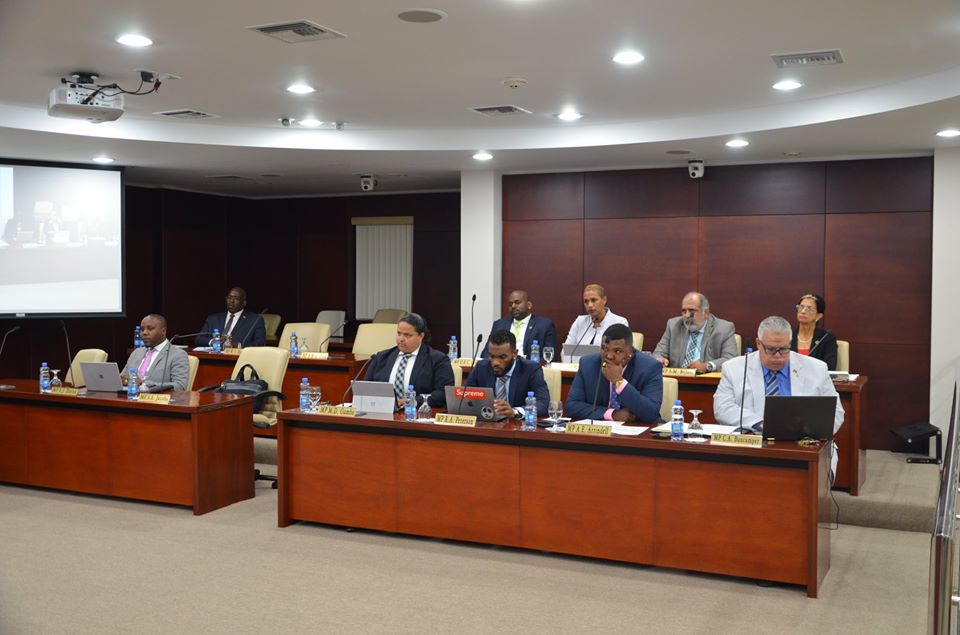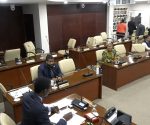Parliament wants changes to screening process for candidate-ministers

PHILIPSBURG – The parliament seems to be getting ready for changes to the legislation that regulates the screening of candidate-ministers. Draft legislation prepared by the government is currently under legal in-house review and an initiative law tabled back in the day by former MP Leroy de Weever is waiting for handling by the legislators, though it seems likely that the two proposals will be merged into one.
Parliament debated the issue on Friday, where Prime Minister Silveria Jacobs answered questions MPs had asked in a previous meeting.
Jacobs said that prior to 1994 commissioners in the executive council of what was then the island territory of St. Maarten were not screened at all. After 1994 screening was put in place after candidates had been appointed. These days, candidate-ministers are screened before their appointment “to save them the embarrassment of having to resign” in case screeners found something that make them unfit for the post.
Jacobs said that the formateur, the governor, the national security service VDSM, the attorney-general and heads of department are involved in the execution of the screening process.
“No screening takes place without the permission of candidates,” Jacobs explained. “The screening looks at your behavior over time to make sure it is integer; it also looks at finances and suspicious transactions and the attorney-general checks whether candidates have pending cases or convictions to their name.”
Currently, the role of the governor is crucial in the whole process. “The governor swears new ministers in. If there is disagreement about the suitability of a candidate, the formateur can scream, cry, kick and make reports but if the governor determines that someone is not a good candidate it is not going to happen,” said Jacobs, who functions as the formateur for the incoming government. She pointed out that the outgoing prime minister also has to sign off on the appointments.
Jacobs furthermore informed parliament that the screening process usually takes between six and eight weeks. For the screening that is currently underway since February 12 – and that had an original deadline of February 23 – the finish line is still around two weeks away.
Jacobs suggested to parliament that it establish an integrity and security parliamentary committee; this committee could “conduct consultations on the policy concerning the services of entities involved with the national security service. Jacobs suggested that such a committee should consist of the faction leaders in parliament.
MP Christophe Emmanuel asked for confirmation that the governor takes the ultimate decision about the appointment of candidate-ministers. MP Claudius Buncamper asked whether the governor, in case he rejects a candidate, is obliged to send the appointment decree for annulment to the kingdom. Asked later by Emmanuel where such an annulment request should be sent, Jacobs admitted that she was not sure: it could be the Kingdom Council of Ministers or the Council of State,” she said.
Article 21 of the Regulation for the Governor establishes that the governor does not sign a national decree if this is at odds with the Kingdom Charter, an international regulation, a kingdom law or a general measure of national administration, or with interests of which the provision is within the kingdom’s authority. In these cases, the governor immediately informs the King.
National decrees can be annulled by kingdom decree, after advice from the Council of State. Proposals to annul are handled by the Kingdom Council of Ministers.
MP Emmanuel expressed his discomfort with the position of the governor in the process to appoint candidate ministers. “If one person takes all the decisions, what are we here for?” he said.
Emmanuel referred to the election results of former MP Theo Heyliger in the 2014, 2016 and 2018 elections, saying that the votes Heyliger won represent the wishes of “a large portion of the population.”
MP Sarah Wescot-Williams asked whether it is the government’s intention to move the screening process away from the governor.
MP Rolando Brison said that he is unhappy with the current screening process. “It should be more transparent,” he said, suggesting a process to elect, rather than appoint, the governor. His main focus was however elsewhere. “Our constitution gives us the power to deal with the things we are not happy with.”
However, article 129 of the constitution makes clear that the powers of the local parliament are limited when it comes to making changes to it. Proposed changes to articles related to the authority of the governor for instance have to be presented to the kingdom government for approval.
Brison suggested the reestablishment of a department of constitutional affairs and noted furthermore that the current certificate of good conduct is “a far-reaching legal document.”






















